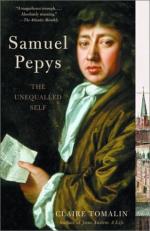Which Pall telling to Ashwell, and she speaking some
words that her mistress heard, caused great difference
among them; all which I am sorry from my heart to
hear of, and I fear will breed ill blood not to be
laid again. So that I fear my wife and I may
have some falling out about it, or at least my father
and I, but I shall endeavour to salve up all as well
as I can, or send for her out of the country before
the time intended, which I would be loth to do.
In the evening by water to my coz. Roger Pepys’
chamber, where he was not come, but I found Dr. John
newly come to town, and is well again after his sickness;
but, Lord! what a simple man he is as to any public
matter of state, and talks so sillily to his brother
Dr. Tom. What the matter is I know not, but
he has taken (as my father told me a good while since)
such displeasure that he hardly would touch his hat
to me, and I as little to him. By and by comes
Roger, and he told us the whole passage of my Lord
Digby to-day, much as I have said here above; only
that he did say that he would draw his sword against
the Pope himself, if he should offer any thing against
his Majesty, and the good of these nations; and that
he never was the man that did either look for a Cardinal’s
cap for himself, or any body else, meaning Abbot Montagu;
and the House upon the whole did vote Sir Richard
Temple innocent; and that my Lord Digby hath cleared
the honour of his Majesty, and Sir Richard Temple’s,
and given perfect satisfaction of his own respects
to the House. Thence to my brother’s, and
being vexed with his not minding my father’s
business here in getting his Landscape done, I went
away in an anger, and walked home, and so up to my
lute and then to bed.
2d. Up betimes to my office, and there all the
morning doing business, at noon to the Change, and
there met with several people, among others Captain
Cox, and with him to a Coffee [House], and drank with
him and some other merchants. Good discourse.
Thence home and to dinner, and, after a little alone
at my viol, to the office, where we sat all the afternoon,
and so rose at the evening, and then home to supper
and to bed, after a little musique. My mind
troubled me with the thoughts of the difference between
my wife and my father in the country. Walking
in the garden this evening with Sir G. Carteret and
Sir J. Minnes, Sir G. Carteret told us with great
contempt how like a stage-player my Lord Digby spoke
yesterday, pointing to his head as my Lord did, and
saying, “First, for his head,” says Sir
G. Carteret, “I know what a calf’s head
would have done better by half for his heart and his
sword, I have nothing to say to them.”
He told us that for certain his head cost the late
King his, for it was he that broke off the treaty
at Uxbridge. He told us also how great a man
he was raised from a private gentleman in France by
Monsieur Grandmont,
[Antoine, Duc de Gramont,
marshal of France, who died July 12th,
1678, aged seventy-four.
His memoirs have been published.]




